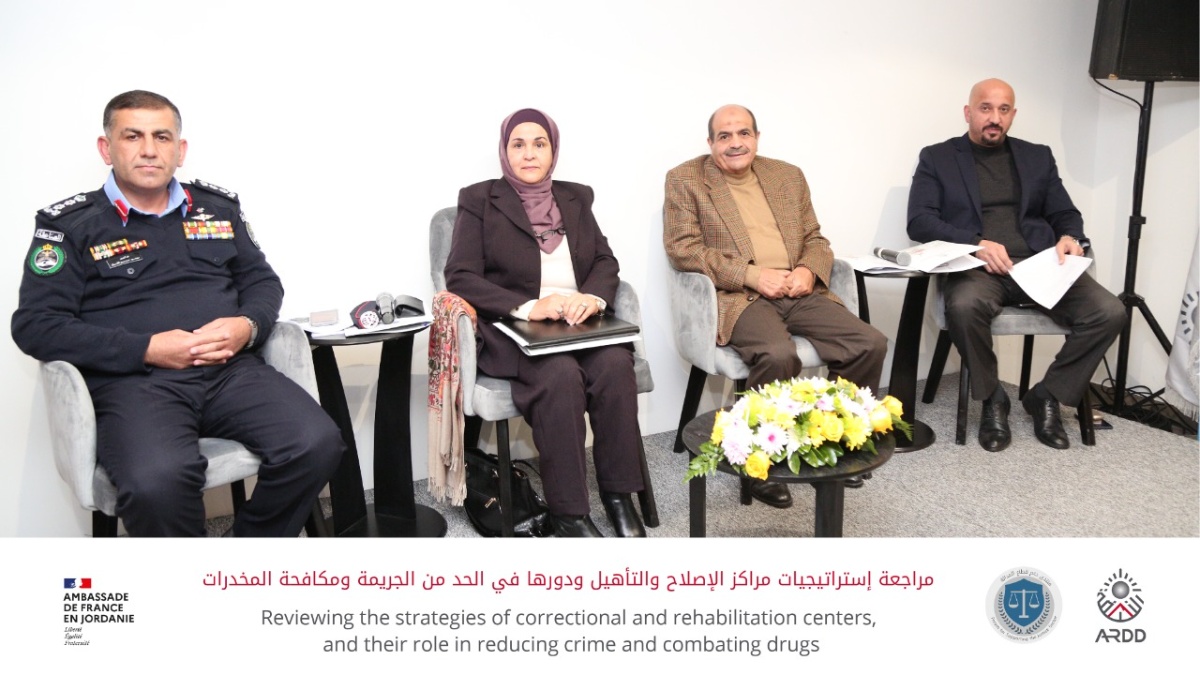Comparably to other Arab countries, overcrowding of prisons is not a new phenomenon. However, this issue is worsening as per the stats of the Public Security Directorate. The number of residents in rehabilitation and correction centers to 21,925 which are equipped to host 13 thousand individuals.
Experts say it is one of the most challenging issues in the country. The increased levels of violence, limited healthcare, and the deteriorating rehabilitation and correction processes, particularly for drug dependency cases. Despite the numerous strategies for rehabilitation and correction centers, challenges remain unresolved.
The Forum for Supporting the Justice Sector, functioning under the umbrella of the Arab Renaissance for Democracy and Development (ARDD), and in partnership with Durrat Al-Manal for Development and Training held a dialogue session titled “Reviewing the Strategies of Correctional and Rehabilitation Centers and Their Role in Reducing Crime and Combating Drugs”. The session was held on Tuesday 29th November 2022 under the Enhancing the Public Trust in the Justice Sector Through Social Dialogue project and funded by the French Embassy. It aimed at examining the procedures and requirements of strategies for rehabilitation and correction centers for the reintegration of residents into society and combating drugs through treatment and early detection.
President of the National Coalition for Combating Narcotics Tayel Al-Majali said “the situation is very dire; we are facing a war. The issue of narcotics is becoming a political one that must be handled with resolution.”
He added: “there are over 250 narcotics factories in a neighboring country that are attempting to export these toxins to us and other countries.” He stressed the importance of effective partnerships and uniting the efforts of official institutions, civil society organizations, and the private sector to combat narcotics and establish preventive programs.
Mahmoud Qiam, Director of the Juweideh Reform and Rehabilitation Centre spoke about the pillars of strategies for rehabilitation centers that included limiting crime, promoting security within communities, respecting human rights, developing capacities of staff in centers, increasing numbers of vocational rehabilitation participants, decreasing recidivism rates, and creating a reformative, safe, and human environment that improves residents’ reality and addresses their problems.
He spoke about alternative punishment and explained that a sentence for a misdemeanor punishable by less than three years in prison, is to be replaced with an alternative punishment. 257 individuals benefited from this rule so far. This rule aims at offering offenders the chance to correct their behaviors and prevent them from interacting with other offenders.
Former Chief of Women Police, retired Col. Hana al-Afghani stressed the importance of aftercare for women residents of the only women’s center located in Juweideh. The center is located in the southeast of Amman and is designed to accommodate 450 women only. The center hosts women who are administratively detained or sentenced. She noted that civil society and the private sector have a role in women’s reintegration into the community and recidivism prevention.
Speaking about the combating narcotics strategies, Lieutenant Ghaith Smadi, Head of Amman’s Anti-Narcotics Division, stressed the importance of the provision of specialized doctors to determine each individual’s drug dependency status once detained. This would help set plans for the treatment of individuals. He stressed the importance of civil society, universities, and schools’ role in raising awareness for all society groups through education on the dangers of narcotics.
Participants recommended a focus on preventive and care strategies inside rehabilitation centers and defining immediate solutions for the overcrowding of centers. They also recommended the introduction of national and private projects to improve services offered to residents and agreements between civil society and rehabilitation centers, especially for residents’ aftercare.
In conclusion, it is important to acknowledge that improving the reality of residents of rehabilitation centers is not the responsibility of one body. It is the result of the collaborative institutional efforts to provide comprehensive rights-based care covering all stages starting with the moment an individual is moved into a center until they are released and supported to remain free.



